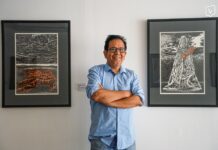THE international documentary, “Give Up Tomorrow,” is a rousing indictment of the Philippine justice system that must be seen by everyone. Originally shown in the Tribeca Film Festival, the festival organized by Hollywood actor Robert De Niro, the movie questions the conviction and sentencing to life imprisonment of 19-year-old Cebuano-Spaniard Francisco Juan “Paco” Larrañaga in connection with the gruesome 1997 murders of sisters Marijoy and Jacqueline Chiong in Cebu, despite overwhelming evidence in favor of Larrañaga.
Directed by Michael Collins and produced by Filipino Martin Syjuco, Give Up Tomorrow gives a voice to Larrañaga, who’s now in Spain serving his life sentence based on a special arrangement between Manila and Madrid. The convict is one of the so-called “Chiong Seven."
The Chiong sisters were raped and murdered in Cebu on July 16, 1997. Only Marijoy’s body was found while Jacqueline’s body remains missing. The police quickly arrested Larrañaga and six other “juvenile delinquents” and presented them to the media as the “Chiong Seven.”
Despite several witnesses who said that Larrañaga was in Manila studying culinary arts during the killings, the police stuck to their guns and the court refused to admit testimonies and documents in his favor.
Larrañaga and the rest of the Chiong Seven were declared guilty and sentenced to life imprisonment. The Supreme Court ruled out their appeal and affirmed their sentencing by lethal injection.
Following president Gloria Macapagal-Arroyo’s abolition of the death penalty, negotiations between the Philippines and Spain started to have Paco’s incarceration be continued in Spain . Up to this day, Paco, now 34 years old, is detained in a jail in San Sebastian, Spain.
The documentary hints that the victims were killed by a crime syndicate with strong connections with the powers.
The documentary, which had its Philippine premiere at the Cinemalaya film festival last July, won several prestigious awards, including the Audience Award, Best New Director and Special Jury Prize in the Tribeca Festival, and Best Documentary at the Anchorage Film Festival. John Joseph G. Basijan













